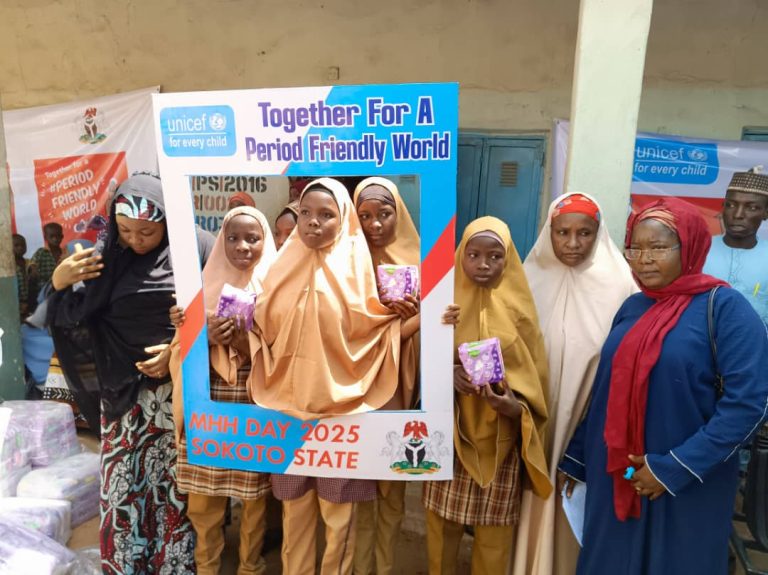In commemoration of the 2025 Menstrual Hygiene Day, the United Nations Children’s Fund (UNICEF), in collaboration with the Sokoto State Rural Water Supply and Sanitation Agency (RUWASSA), organized an awareness campaign to educate students on proper menstrual hygiene practices.
ASHENEWS reports that the Menstrual Health and Hygiene Day (MH Day) is observed annually on May 28. It was initiated by the German-based NGO WASH United in 2014 to raise global awareness and advocate for good menstrual health and hygiene (MHH) practices.
At the event, which held at Turaki Government Secondary School in Sokoto on Wednesday, UNICEF Sokoto Field Office’s WASH specialist, Derek Hyu Kim emphasized the importance of Menstrual Hygiene Day and its role in promoting a menstrual-friendly world.
According to him, the initiative works towards dismantling harmful stereotypes about menstruation, which affects women’s dignity, safety, and opportunities for education and employment.
“The key components for a menstruation-friendly environment are promoting social acceptance, which encourages a cultural shift to accept menstruation positively, reducing stigma.
“Education in menstruation hygiene, which provides comprehensive education about menstrual health and hygiene products; Access to affordable menstrual products, which ensures that all individuals have access to cost-effective menstrual products,” he said.
On the importance of clean menstrual hygiene facilities, Kim said “Clean facilities are vital in schools, workplaces, and public spaces, including well-equipped toilets with water, soap and appropriate disposable methods.”
He explained that UNICEFs WASH programme initiatives focus on installing menstrual hygiene facilities in schools to aid girls’ educational experiences and advocating for the integration of the facilities into schools designs to ensure sustainability and accessibility.
He emphasised the need for collective action to improve menstrual health and hygiene, while acknowledging the audience’s potential contributions to the important cause.
Rabi Mohammad, a medical professional expressed concern over the challenge of managing menstrual health by many girls.
According to her, menstruation is a natural biological process, which has significant impact on women’s health.
“Menstruation is a monthly biological process with significant health implications. It is essential to maintain hygiene before, during, and after menstruation to prevent infections,” she said, adding that menstruation should not be viewed as a taboo or illness.
She encouraged girls to speak openly with their parents, guardians, or teachers about any changes they face, especially those who are yet to begin menstruation.
“Girls should feel confident to seek guidance and support without shame,” she added, also highlighting the importance of proper disposal of used sanitary materials and maintaining cleanliness during periods.
Also speaking, Gender Desk Officer at the Sokoto State Universal Basic Education Board (SUBEB), Aisha Ahmed, commended UNICEF for promoting students’ health and wellbeing. She described the initiative as a vital step toward strengthening the state’s efforts in healthcare and child development.
A representative of Cooperazione Internazionale (COOPI), Zainab Ibrahim urged students to prioritize sanitation during menstruation, while reassuring them of COOPI’s continued engagement in safeguarding the health of women and children.
Speaking earlier in his opening remarks, the Vice Principal of the school, Lukman Mudassir, commended UNICEF and RUWASSA for their support and pledged the school’s commitment to sustaining hygiene education among students.
The event featured the distribution of sanitary pads, health education session, and an interactive question-and-answer segment with live demonstrations on menstrual hygiene practices.


